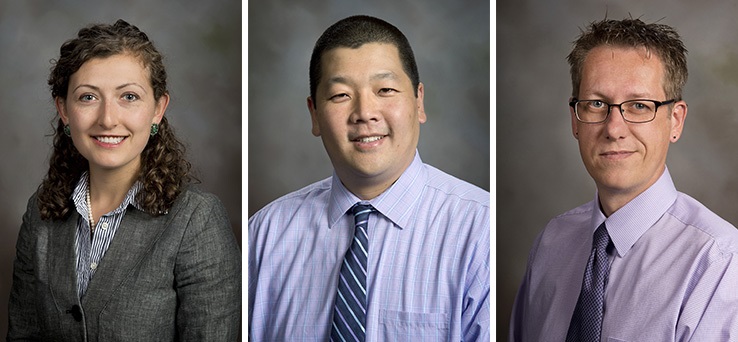VT Engage announces inaugural class of Engagement Faculty Fellows

Three Virginia Tech faculty members have been selected for the first class of Engagement Faculty Fellows at VT Engage: The Community Learning Collaborative.
They are:
- Sarah Misyak, a postdoctoral scholar in the Department of Human Nutrition, Foods, and Exercise in the College of Agriculture and Life Sciences;
- Takumi Sato, clinical assistant professor in the School of Education in the College of Liberal Arts and Human Sciences; and
- Brett Shadle, associate professor in the Department of History in the College of Liberal Arts and Human Sciences.
With VT Engage support, Engagement Faculty Fellows will develop community learning courses, which incorporate service-oriented hands-on experiences and learning opportunities into the curriculum.
In 2012-13, nearly 4,000 students participated in 178 community learning courses at Virginia Tech. Projects ranged from volunteering at nursing homes to tutoring K-12 students to partnering on projects with the Special Olympics and Intellectual Disabilities Agency.
"When student learning is shaped by authentic community experiences, it helps students reflect on and enhance their own journey of Ut Prosim (That I May Serve)," said Perry Martin, senior associate director of community learning at VT Engage. "This program will help us explore innovative approaches to leveraging community assets and needs as valuable teaching tools."
The program will encourage fellows and VT Engage to work collaboratively to create deeper connections to community partners through course projects, employ practices that enhance student learning, and strengthen the community of engaged faculty at Virginia Tech. Fellows will assess and reflect on community and student outcomes and will serve as mentors to other faculty.
Each fellow will receive a $5,000 stipend and a $1,500 grant to support the implementation of their courses. Misyak and Sato plan to expand existing courses and experiential learning opportunities.
Misyak’s plans to support a summer internship program by creating two courses that will "prepare nutrition students for entering community settings and working with diverse populations."
Sato plans to improve a course he currently teaches, Dynamics of the 21st Century Classroom, which prepares students for the challenges facing teachers today. Currently, his course requires students to volunteer 10 hours during the semester and he plans to increase that to 20 hours and incorporate more reflection activities.
Shadle plans to offer a new course this fall, Development and Humanitarianism in Africa, which will "trace the history of western involvement in Africa". The course will offer an opportunity for students to work with resettled refugees in Roanoke via the student-led Coalition for Refugee Resettlement.
Misyak received her bachelor’s, degree, master’s degree, and Ph.D. from Virginia Tech. She is a member of the Appalachian Foodshed Project management team and board member of Friends of the Farmers Market.
Sato has a Ph.D. from Michigan State University and a bachelor’s degree Washington University in St. Louis. He served as a graduate assistant for the Journal of Research in Science Teaching.
Shadle has a doctoral degree from Northwestern University and bachelor’s degree from Northern Illinois University. He is the director of Service-Learning Kakuma, an experiential learning program at the Kakuma Refugee Camp in Kenya.
Written by Lindsey Gleason.









